Mustafa Al-Kadhimi facts for kids
Quick facts for kids
Mustafa Al-Kadhimi
|
|
|---|---|
|
مصطفى الكاظمي
|
|
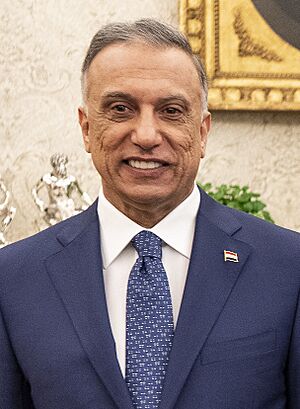
Al-Kadhimi in 2020
|
|
| Prime Minister of Iraq | |
| In office 7 May 2020 – 27 October 2022 |
|
| President | Barham Salih Abdul Latif Rashid |
| Preceded by | Adil Abdul-Mahdi |
| Succeeded by | Mohammed Shia' Al Sudani |
| Minister of Foreign Affairs | |
| Acting 12 May 2020 – 6 June 2020 |
|
| Prime Minister | Himself |
| Preceded by | Mohamed Ali Alhakim |
| Succeeded by | Fuad Hussein |
| Director of the Iraqi National Intelligence Service | |
| In office 7 June 2016 – 7 May 2020 |
|
| Prime Minister | Haider al-Abadi Adil Abdul-Mahdi |
| Preceded by | Zuheir Fadel Abbas Ghirbawi |
| Personal details | |
| Born |
Mustafa Abdul Latif Mishatat
5 July 1967 Baghdad, First Iraqi Republic |
| Citizenship | |
| Political party | Independent |
| Residences | Republican Palace, Baghdad |
| Alma mater | Al Turath University College (LLB) |
| Occupation |
|
| Signature |  |
Mustafa Abdul Latif Mishatat (Arabic: مصطفى عبد اللطيف مشتت, romanized: Muṣṭafá ʻAbd al-Laṭīf Mushattat; born 5 July 1967), known as Mustafa al-Kadhimi, is an Iraqi politician and former intelligence officer. He served as the prime minister of Iraq from May 2020 to October 2022.
Before becoming prime minister, he was a writer for several news outlets. He also led the Iraqi National Intelligence Service from 2016 to 2020. For a short time in 2020, he was the acting Iraqi Minister of Foreign Affairs. After his time as Prime Minister, he lived abroad for over two years. He returned to Baghdad in February 2025.
Contents
Mustafa Al-Kadhimi's Early Life and Career
Mustafa Al-Kadhimi was born in Baghdad, Iraq, in 1967. His father, Abdul Latif, was from Al-Shatrah in southern Iraq. His family later moved to Baghdad.
Al-Kadhimi was against the government of Saddam Hussein. In 1985, he left Iraq and lived in Iran, then Germany, and finally settled in the United Kingdom. He lived in exile for many years and became a citizen of the UK.
Returning to Iraq and Media Work
After the American-led invasion of Iraq in 2003, Al-Kadhimi went back to Iraq. He helped start the Iraqi Media Network. He also worked as the executive director of the Iraq Memory Foundation. This group collected information about the actions of Saddam Hussein's government.
He wrote articles for the Iraqi version of Al-Monitor and other publications. He also published several books. For three years, Al-Kadhimi was the senior editor of Iraq's Newsweek magazine.
Leading the Iraqi National Intelligence Service
Al-Kadhimi studied law at Al-Turath University. He was in charge of improving the Iraqi National Intelligence Service (INIS). He worked to make the agency more effective and follow international standards.
Under his leadership, the INIS focused on fighting terrorism both inside and outside Iraq. It played a key role in Iraq's fight against ISIL, also known as Daesh. He also built connections with many countries and groups working against ISIL.
In 2017, Al-Kadhimi visited Riyadh with Haider al-Abadi. He gained attention when he was seen greeting Mohammed bin Salman.
Becoming Prime Minister of Iraq
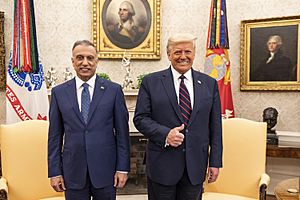
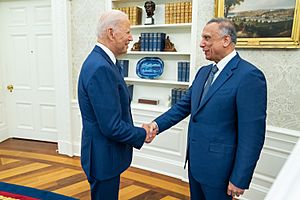
In October 2019, large protests happened across Iraq. The prime minister at the time, Adel Abdul Mahdi, and his government resigned. Mustafa Al-Kadhimi became a top choice to lead the country.
On April 9, 2020, President Barham Salih named him as the person chosen to be prime minister. He was the third person picked for the job in just ten weeks. After almost six months of political talks, Iraq's parliament approved Al-Kadhimi as Prime Minister of Iraq on May 6, 2020.
Before taking office, Al-Kadhimi said his government would solve Iraq's many problems. He promised early elections. He also vowed that Iraq would not be used as a battleground by other countries. He took office during a difficult time for Iraq, with big protests, low oil prices, and the COVID-19 pandemic.
Challenges and Reforms as Prime Minister
When he became prime minister, Al-Kadhimi promised to help Iraq through a serious money crisis. He said the government's money was "nearly empty" because of years of waste and falling oil prices. His government planned to cut public spending. They also wanted to check the salaries paid to millions of Iraqis. However, they stopped this plan after people complained.
In August 2020, he hired many unemployed Iraqis at the Ministry of Defence. But this was not enough to stop protests outside other government offices where people demanded jobs. He faced challenges because many members of parliament supported Iran and disagreed with his plans. He also worked to investigate the deaths of protesters and activists.
In October 2020, Al-Kadhimi's government approved an economic plan called the "White Paper." This plan included over 200 ideas to fix Iraq's economic problems.
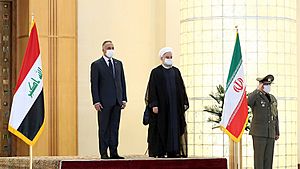
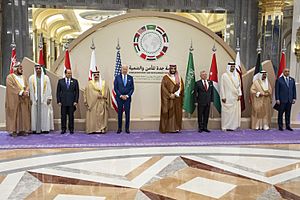
In July 2021, Al-Kadhimi and U.S. President Joe Biden agreed to end the U.S. combat mission in Iraq by the end of 2021. After his visit to the United States, Iraq got back 17,000 ancient items. These items had been taken by ISIS and sold to the Museum of the Bible. US authorities helped recover them.
Criticisms and Accusations
Al-Kadhimi faced criticism regarding missing money from Iraq's tax deposits. In September 2021, about $2.5 billion was reported missing. Investigators believed this money was given to politicians and used for bribes. This large amount of missing money caused the Iraqi currency to lose value and property prices in Baghdad to rise.
Some groups, like Kata'ib Hezbollah, accused Al-Kadhimi of being involved in the deaths of their leader Abu Mahdi al-Muhandis and Iranian General Qasem Soleimani. They claimed he worked with the United States. In response, Al-Kadhimi ordered the Counter Terrorism Service (CTS) to investigate rocket attacks in Baghdad. He promised to deal with groups that did not follow the law.
Surviving an Assassination Attempt
In the early hours of November 7, 2021, Al-Kadhimi survived an assassination attempt. An explosive drone targeted his home in Baghdad's heavily protected Green Zone. Two other drones were shot down by the army. Many suspected that groups supported by Iran were behind the attack. This was possibly in response to Al-Kadhimi's efforts to control these groups and reduce foreign influence in Iraq.
Experts believed the assassination attempt happened after pro-Iranian parties lost seats in the 2021 Iraqi parliamentary election.
After Being Prime Minister
In July 2022, the French government gave Al-Kadhimi the Legion of Honour. This is France's highest award. The French ambassador to Iraq presented the medal on behalf of President Emmanuel Macron. It was given to him for his work in making relations between Iraq and France stronger. During this meeting, Al-Kadhimi spoke about the importance of cooperation between the two countries, especially in economic development and security.
After he finished his term as prime minister, Al-Kadhimi lived in London and the United Arab Emirates. On February 25, 2025, Al-Kadhimi returned to Iraq. He had been away due to safety concerns, including the assassination attempt in 2021. He did not say if he would run in future elections. He stated that his participation would depend on how fair and trustworthy the elections were.
See also
 In Spanish: Mustafa Al-Kadhimi para niños
In Spanish: Mustafa Al-Kadhimi para niños
 | Kyle Baker |
 | Joseph Yoakum |
 | Laura Wheeler Waring |
 | Henry Ossawa Tanner |

